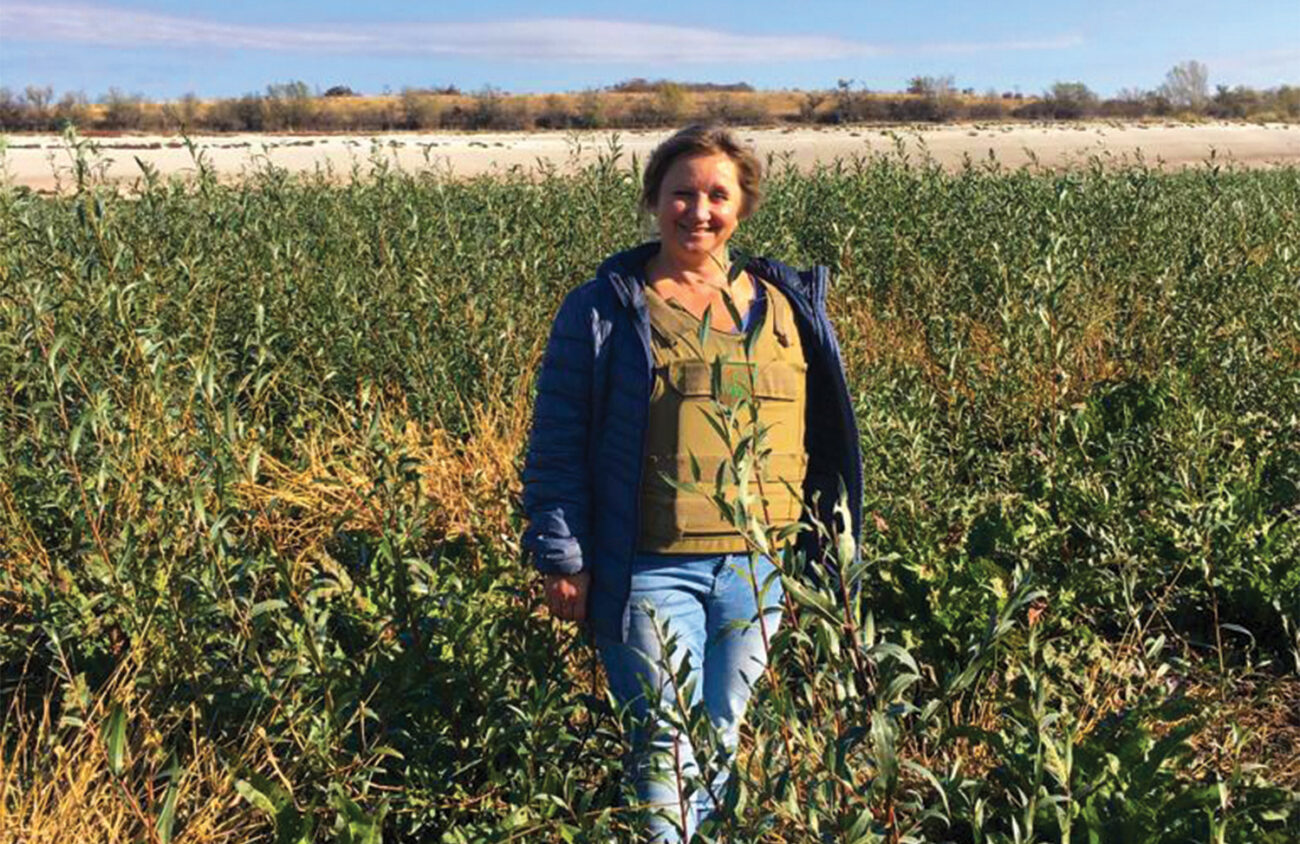On Oct. 20 Olena Kravchenko was with a team of environmental scientists taking a soil sample to test it for chemicals in Kamianska Sich National Nature Park in southern Ukraine when she saw, at the corner of her eye, Russian drones circling her team.
Kravchenko and her team had to make a snap decision: finish collecting their soil samples and risk what comes next or flee to safety. Believing there was enough time, they went ahead and attempted to finish collecting their samples. Then she heard the bombs.
“We heard them warn us, and then we got bombed,” Kravchenko says. “We just jumped in the car to some agricultural field, and we survived.”
Kravchenko is the executive director of Environmental People Law (EPL) in Ukraine. EPL is based out of Kyiv and has a full in-person working staff of lawyers and scientists. The nonprofit has been a leader in helping create domestic environmental legislation change and raising funds to support research on the environmental impacts of the war. With the help of Eugene nonprofit Environmental Law Alliance, ELAW, she is working towards creating a plan to restore wildlands and forests that have been destroyed by Russia’s war on Ukraine.
“Nature is the silent victim in Ukraine,” Kravchenko says. “And we have to be the voice of this nature.”
Kravchenko first visited Eugene 15 years ago to see family that lived here and to meet with ELAW about supporting EPL. The two organizations have had a working relationship ever since.
ELAW Communications Director and Fellowship Program Director Maggie Keenan says that ELAW primarily lends financial support as well as access to the scientists and research that EPL may need to come up with Ukraine’s restoration plan. Keenan adds that ELAW currently has six scientists on staff with a variety of focus areas that include environmental restoration as well as a public health economist and a legal team. “We have been working with EPL for decades now and we are just in awe of their work and commitment to protect Ukrainians and their natural environment,” she says.
The first step to addressing the destruction is assessing the damage. Based on EPL’s research, 30 percent of Ukraine’s land has been contaminated with toxic chemicals from bombs, she says. For example, when Russia bombs pesticide storage warehouses, all of those chemicals seep into the soil. Some of the soil affected can be cleaned with the right technology, she says, but a lot of the soil is destroyed forever.
“We don’t have any of the right tools and technology to deal with this,” Kravchenko says. “If you don’t have enough domestic legislation, you don’t have enough technology to solve this problem. We need help from democratic countries around the world.”
Another 30 percent of the Ukrainian land is littered with landmines, Kravchenko says. She has been researching other war-torn countries that have dealt with digging up land mines and found that demining Albania took about 20 years. She estimates that Ukraine will need 30 to 50 years to complete the demining process.
“We lost over 3 million hectares [roughly 7.4 million acres] of forest,” Kravchenko says. “Which means the next generation will not be able to see the unique Ukrainian nature which we had before. My grandchildren will never see the unique native plants I saw.”
She estimates that restoring the nature that has been destroyed by Russian troops will cost billions of dollars. One of the ways that Kravchenko is tackling the issue is by trying to get new legislation passed in regards to environmental inspection. EPL and Ukraine’s Ministry of Environment are working together to create stronger legislation Ukrainian environmental enforcement and liability.
Kravchenko would like to get to the point where Ukraine could charge Russia with “ecocide,” and has pointed to international alliance groups like Stop Ecocide International in Europe as key players in advocating to get ecocide in the Rome Statute, which established four core international crime: genocide, crimes against humanity, war crimes and the crime of aggression.
However, Ukraine has not ratified the Rome Statute. The U.S. and Russia are also among the 123 countries that are not party to it.
“We are pushing for the government to ratify the Rome Statute because without ratification, it is so difficult to apply this new case to the International Criminal Court,” Kravchenko says.
Most recently, Kravchenko took a trip to Brussels and Berlin to meet with the directorate generals for the environment in the European Commission to discuss what a green recovery plan for Ukraine could look like and how other countries in the European Union can assist.
“We are still just trying to figure out how we can push the government in the right direction to make a green recovery plan possible,” Kravchenko says. ν
To learn more about Olena Kravchenko’s work with ELAW go to ELAW.org. For her work with EPL you can go to EPL.org.ua/en/.
